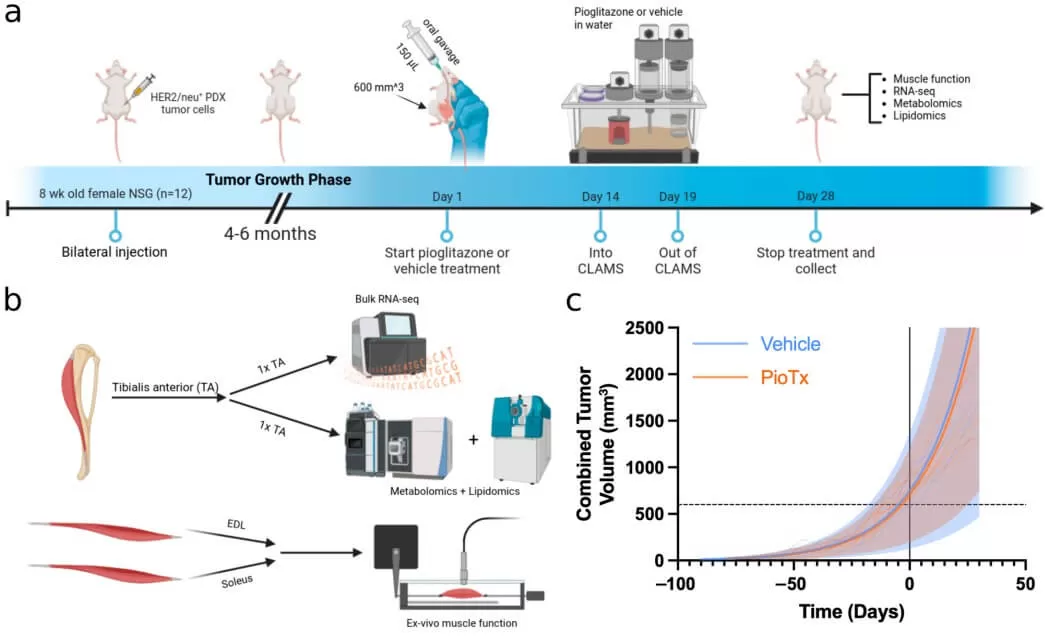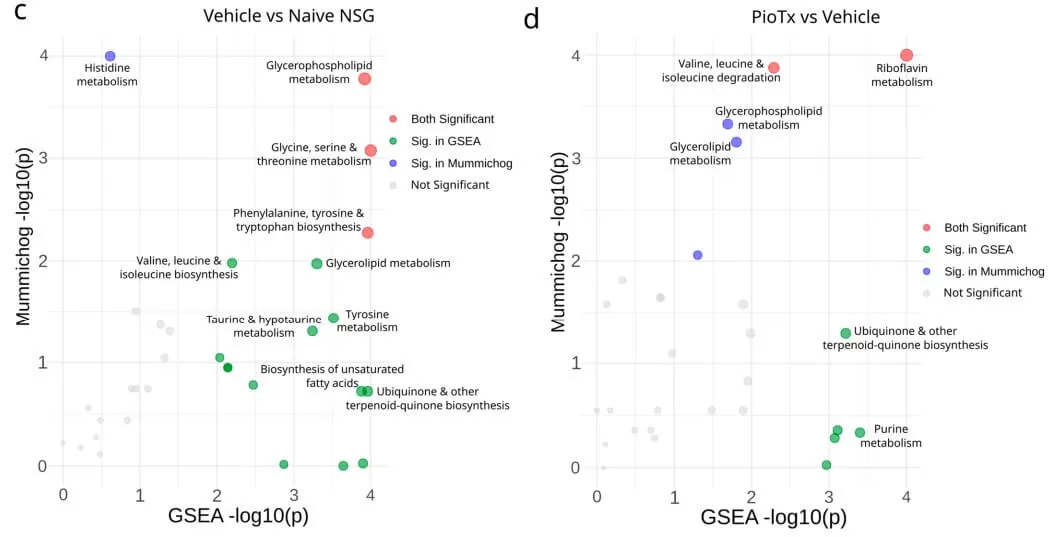Multi-Omic Insights into Pioglitazone’s Effects on Breast Cancer-Induced Muscle Fatigue
We are excited to highlight a preclinical study titled “Preclinical Multi-Omic Assessment of Pioglitazone in Skeletal Muscles of Mice Implanted with Human HER2/neu Overexpressing Breast Cancer Xenografts” published in Cancers (2024). This research employed transcriptomics, metabolomics, and quantitative lipidomics to investigate the therapeutic potential of pioglitazone, an FDA-approved PPARγ agonist, in alleviating breast cancer (BC)-associated skeletal muscle fatigue. Leveraging advanced LC-MS/MS-based lipidomics and metabolomics, the study identified molecular improvements in muscle metabolism and lipid profiles, though functional fatigue remained unresolved.
Breast cancer remains the second most diagnosed cancer globally, with over 2 million new cases annually. Beyond its direct oncological impact, BC patients frequently endure debilitating fatigue—affecting up to 85% during treatment and 66% in remission—yet no approved therapies exist. This fatigue is linked to metabolic dysregulation in skeletal muscle, including mitochondrial dysfunction and lipid accumulation. Understanding these mechanisms requires multi-omics approaches. Transcriptomics reveals gene networks, metabolomics uncovers metabolic shifts, and lipidomics maps lipid dynamics. Together, these technologies provide a holistic view of disease pathology and therapeutic responses. This study exemplifies how integrating these tools can bridge molecular insights to clinical outcomes, emphasizing the necessity of multi-omics in modern biomedical research.

Overview and characterization of the BC-PDOX mouse model
Pioglitazone Restores Lipidomic Profiles in Skeletal Muscle
Using quantitative lipidomics, researchers analyzed 901 lipids in tibialis anterior muscles. BC-induced dysregulation elevated total ceramides—a lipid class linked to insulin resistance and metabolic dysfunction—by 46% in tumor-bearing mice. Pioglitazone treatment significantly reduced total ceramides (p = 0.048), partially reversing BC-associated lipid accumulation. Subclass analysis highlighted decreases in glycerophospholipids (e.g., PC-O, PE-P), suggesting improved membrane integrity. These findings align with prior cachexia studies, where ceramide accumulation correlates with muscle wasting, underscoring lipidomics’ power in identifying therapeutic targets.
 muscles_1739760470_WNo_1386d729.webp)
Quantitative lipidomics of the Tibialis anterior (TA) muscles
Transcriptomics Reveals Mitochondrial Bioenergetic Activation
Bulk RNA-seq of skeletal muscle demonstrated pioglitazone’s robust activation of mitochondrial pathways. Key upregulated pathways included oxidative phosphorylation (adj. p < 0.001), TCA cycle, and PPAR signaling (Log2FC = 2.58). Genes like Nd4l and Cox7a (critical for electron transport) were elevated, supporting enhanced mitochondrial respiration. However, despite these molecular improvements, ex vivo muscle fatigue testing showed no functional recovery, highlighting a disconnect between transcriptomic rescue and physiological outcomes—a limitation also observed in diabetes studies with short-term TZD treatments.
Metabolomics Uncovers Amino Acid Dysregulation
Untargeted metabolomics detected 1,186 metabolites, revealing BC-induced disruptions in amino acid metabolism. Pathways like valine/leucine degradation and pantothenate biosynthesis were enriched in tumor-bearing mice (FDR < 0.05). Notably, N-butyrylglycine (a marker of mitochondrial β-oxidation defects) surged in BC mice but dropped post-pioglitazone. However, the drug failed to fully restore amino acid homeostasis, suggesting persistent metabolic stress. Compared to single-omics studies, this multi-omic approach captures broader systemic dysregulation but underscores the complexity of reversing fatigue.

Untargeted metabolomics of the Tibialis anterior muscle
This study exemplifies how multi-omics technologies unravel complex disease mechanisms. Lipidomics pinpointed ceramide accumulation as a BC-driven pathology, while transcriptomics highlighted pioglitazone’s mitochondrial benefits. Metabolomics exposed unresolved amino acid imbalances, illustrating the need for longer treatment durations or combinatorial therapies. The integration of these technologies is transformative: lipidomics identifies lipid biomarkers, metabolomics tracks metabolic flux, and transcriptomics maps regulatory networks. For cancer-related fatigue, this approach clarifies why molecular improvements may not immediately translate to functional gains—a critical insight for drug development. Future studies could incorporate proteomics to assess protein turnover rates or explore immunocompetent models to evaluate immune-metabolic crosstalk.
Advancing Research with Metware Bio’s Expertise
At Metware Bio, we specialize in precision multi-omics solutions that drive discoveries like this. Our quantitative lipidomics platform—utilized in this study—combines ultra-performance liquid chromatography (UPLC) with high-sensitivity triple quadrupole-MS/MS, enabling precise quantification of 4,000+ lipids. Paired with our proteomics and metabolomics services, we provide end-to-end support for biomarker discovery and mechanistic studies.
Reference:
Clayton SA, Mizener AD, Whetsell M, Rentz LE, Meadows E, Geldenhuys W, Pistilli EE. Preclinical Multi-Omic Assessment of Pioglitazone in Skeletal Muscles of Mice Implanted with Human HER2/neu Overexpressing Breast Cancer Xenografts. 2024 Apr 20:2024.04.15.589557. doi: 10.1101/2024.04.15.589557.


